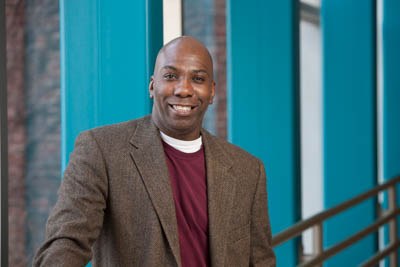David Bolden (BS, Food Science, '87) works to develop, implement, oversee and maintain food quality and safety programs at three family-run flour mills throughout Pennsylvania.

David Bolden
Q: What led you to study food science at Penn State?
A: I'm from Philadelphia and I went to W.B. Saul, an agricultural high school in the area where I was first exposed to the agricultural sciences. I knew from there that I wanted to go to an agricultural university, and the best one I knew of was Penn State. So that was what motivated me to work with the professors here to learn, be the best student I could be, and to launch my career.
Q: How were you introduced to the Ag track in the first place?
A: My mother actually found Saul for me when I was around 13, just coming out of junior high. She wanted me to get a technical education and acquire skills that would get me a good job. We toured a couple of different places, and I really liked Saul. It was not a path that many of my peers had taken. No one that I knew had heard of the school or was really familiar with agricultural studies, and I was the first from my neighborhood to pursue that path. But I loved it, and my time there was very beneficial.
Q: You've worked in a lot of different food industries. What ties all of those experiences together for you?
A: Yes, I have worked in cheesecake manufacturing, vegetable processing, jams and jellies processing, soup manufacturing, meat processing, and now the flour milling industry. Any type of food manufacturing requires some kind of quality assurance program. Even though they each have their own different processes that you have to learn, if you have a good grasp of the basics of quality control and food safety, you are able to apply them in any food manufacturing sector.
Q: Thinking back to your time at Penn State, what coursework was most valuable in preparing you for your career?
A: Basically the entire food science curriculum. What really cemented it all for me was the field trips we took to different food manufacturing facilities. Classes such as dairy science, meat science, and food microbiology were all designed to educate you and expose you to all the different facets of the agricultural sciences. We were told that these disciplines were utilized in industry. After participating in the field trips, we had the opportunity to speak with industry professionals and see these disciplines practiced in a manufacturing environment. This really helped to connect the dots with what we were learning in class from our professors and what they were doing at production facilities. We could all see that the skills we were learning were preparing us for a career in any one of those specialties, so it all depended on what we wanted to focus on. It was a well-rounded education and exposure to the different industries in food science. It's how I knew I could do more than just one thing.
Q: You've talked about breaking into the food manufacturing industry through an entry-level job. What was the motivation behind that for you?
When I went into the market in 1987, I knew I wanted a job in the industry. I was a Quality Control Technician at a jam and jelly manufacturer. I had my degree, but I hadn't participated in summer internships the way most students today have. I knew that to achieve my career aspirations, I would need to build my resume, so I moved up to north New Jersey and took a job that I could get with just a degree. From there I was able to find another opportunity to become a raw foods inspector for a soup manufacturer. So my initial job experience, combined with my degree, helped me to move up. That's what I stress to students--get the experience, even if you need to volunteer. You may not get a management job right out of school, but don't be discouraged by that. There's a fair amount of competition and you'll have to gain the experience to succeed in the industry.
Q: Was there anyone in particular who helped you at Penn State? And how do you feel connected to the university today?
Well, in my time in college, my adviser was instrumental in talking to me and giving me instruction and guidance. Today, I'm connected through my family and other graduates from the school. We get together at the Penn State BAR (Black Alumni Reunion) every couple of years, and I've made some great friends and connections through that. Penn State makes it easy to get reacquainted with the people you graduated with.
Q: Your wife is also an alum, so you're a Penn State family. And now your oldest daughter is Horticulture major, so you've become an Ag family, as well. What makes those bonds so strong for you?
My wife and I both agree that the College of Ag is the best college at Penn State. I believe the program prepares you, not only from an educational perspective--for work, for transitioning into society and gaining employment--but also to connect you and build bridges to job opportunities in the larger community. When I look at the college and my degree, the College of Ag did so much to help me grow and matriculate into society, and I want that same advantage for my family.

